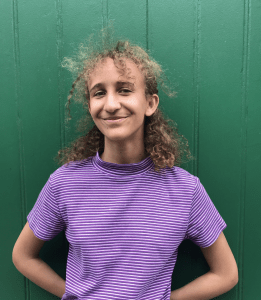2019-2020 Live Deliberately Essay Contest
 Sophie Garrigus, 17
Sophie Garrigus, 17
Honorable Mention, 17-18 Age Group
Los Angeles, CA
My grandfather was a lover of nature. In his apartment building, there was a scrappy patch of bamboo that we used to run through together, imagining it as being much wilder than it really was. He had a favorite tree a few blocks away from his home; it was tall with knobby brown bark and a branch that extended out like an arm unfolding. I remember that while he was still alive, he’d pile a long walking stick and a bottle or two of water into his car and drive out of Los Angeles along looping mountain roads to forest hiking trails where he’d take pictures of everything. Every tree, every pine-needle ridden path, every thin excuse for a mountain spring. There are photos of him covered by bendy branches amongst the exquisitely pedestrian color palette of a Los Angeles fall. There are photos of him in Tanzania under big pillowy banana leaves, photos of him next to the fruiting passionfruit vines that used to lay along the fence in our backyard, and photos of him standing with his walking stick alone in a field of low grey grasses that stretched out for miles in every direction. Nature was absolutely everything to him; its existence and preservation was crucial, fundamental, and absolutely important.
I try to remember him in my environmental science class when I furiously take notes on eutrophication, strip mining, and sprouting mung-beans under salty filter paper. Sitting at my desk under fluorescent light and sleepy air-conditioned air, it’s impossible not to feel the distance between me and environmental chaos. I am miles away from the burning forests in Australia, the paling coral covered by distant ocean water, the sickly polar bear plundering through cold yellow grass. But what I learned from my grandfather is that we have to fight to close the distance between ourselves and nature. We are each capable of connecting to it on a deep and personal level. And because of that, we must each take responsibility for eliciting change in whatever way we can because so much is at stake.
As young people, it can feel paralyzing to listen to the decisions of lawmakers that threaten our world and ecosystems, especially if, like me, you’re below the voting age. But, we live in an age where the empowering and impactful exchange of knowledge is possible no matter your age or location. Social media is a powerful tool to connect us to each other and to bring us closer to events that feel distant. The rousing power of information is not something to be underestimated or taken lightly; taking advantage of the reach we have on social media to help inform our peers, connect them to environmental issues that feel distant, educate ourselves, and recognize the urgency of acting on the climate crisis allows us to be more informed voters, activists, and advocates in the future. “It is not a time of repose” Thoreau writes in 1854. If we couldn’t rest 166 years ago, then we certainly can’t rest now. Now is the time for acting in whatever way we can, even if through something as small as social media.
Thoreau reflects on how the trees in Concord “will soon be cut off,” the only traces of their existence remaining in writing. A world in which wilderness does not exist is a world in which I don’t want to live. We owe future generations as many clear skies, breaths of fresh air, hikes, and fire-free summers as we’ve had. Nature is something we cannot lose. It’s not only our biology that binds us to it, but also our very essence as human beings. Nature is a hub of art and inspiration, a refuge for all that is beautiful and wonderful. It is the fuel for great artists and thinkers like Thoreau, for everyday men like my grandfather, and for younger generations full of people who, like myself, refuse to let the possibility of new life, creation, and beauty disappear because of our irresponsibility and complacency.

